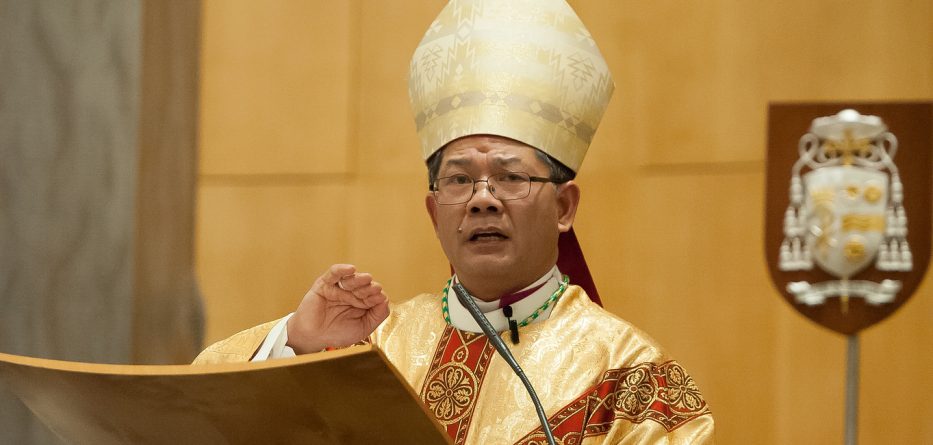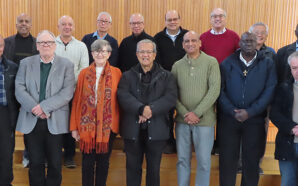Most Reverend Vincent Long Van Nguyen OFM Conv DD STL, Bishop of Parramatta
Homily from 15th Sunday in Ordinary Time, Year C at St Finbar’s Parish, Glenbrook
10 July 2016
Dear friends,
It is a great joy for me to be with you at this Sunday’s Eucharist here at St Finbar’s Glenbrook. Yours is the first parish that I have visited since my installation as your bishop. Following the example of Pope Francis, I’d like to give preference to the periphery, whether it is geographical, socio-economic or otherwise. The Gospel constantly challenges us to go beyond our comfort zone and engage with those who are on the outer ring of our circle of life. Our very journey to God is invariably linked to a missionary journey towards our brothers and sisters, especially those alienated, discriminated, ostracised, wounded, broken and in need of recognition, acceptance, inclusion and love.
This is the essence of the scriptural lesson for this Sunday. In the first reading, Moses instructs the people as they journey towards the Promise Land. After the enemies had been routed, they enjoyed a period of peace, stability and prosperity. There was a real temptation, however, to focus on their immediate concerns and forget what they were meant to be: the people of God in mission. Moses reminds them of the covenant and the mission of making God and his concerns the centre of their existence.
“Obey the voice of the Lord, keep his laws and commandments and you shall return to him with all your heart and soul”.
In the wider context, making God and his concerns the centre of their existence means to honour God and to seek his justice for the poor and the lowly. Elsewhere, Moses would exhort the people not to be a society of enslavement and oppression that they experienced in Egypt. Instead they were to form a post-exodus society which would be the model for all the nations.
The parable of the Good Samaritan also challenges us to recognise and honour God in the other. However, more than fulfilling the Mosaic law of love thy neighbour, Jesus teaches us some home truths that are truly confronting and incisive.
Samaritans were considered outsiders and outcasts by ordinary Jews.
Yet in the parable, it was the Samaritan who was the unlikely hero. For he showed love and compassion to the person in need. On the contrary, the priest and the Levite who were considered the respected class of society and the custodians of tradition were found wanting. They put tradition and law in the way of basic human love. Thus, in crafting the characters in their cultural and religious context, Jesus really upset the tulip cart. He questioned the prevailing assumptions and stereotyped attitudes. He turned the presumed order of moral goodness upside down. The holders of tradition failed the test of good neighbour while the outcast proved himself an unlikely champion of basic human decency, mercy and compassion.
We can no longer understand the parable just in terms of being kind to those in need. It is an incisive lesson that cuts our prejudice to the quick. The lawyer who posed the question to Jesus “who is my neighbour” went away with much more than what he had bargained for. He was challenged to be the neighbour and to be one like the Samaritan. It would have been a profound and indeed humbling revelation: The villain had become a hero and vice versa. The meaning of goodness, humanity, moral uprightness had been redefined. The boundaries of acceptance, inclusion and love had been extended. Jesus had presented to him a radical new way of seeing, acting and relating.
What does it mean for us who have listened to the parable again today in the context of our lives and relationships? Are we similarly challenged in our thinking, attitudes and behaviour? What are the assumptions and prejudices in society and in each of us that need to be questioned by the confronting and incisive lesson of the Gospel? Who are the Samaritans of our time? Who are those that we consider unworthy and incapable of conforming to our moral norms and standards? Who are those that are considered outsiders and therefore not entitled to what we are entitled to?
There are two groups of people that Pope Francis singled out for attention recently: refugees and gays. To the first group, he deplored what he called the globalisation of indifference. He challenged the culture of well-being and entitlement that makes us think of ourselves, that makes us insensitive to their cries, that makes us live in soap bubbles and that brings indifference to them. To the second group, he said the church should apologise for the way it treated them, often with prejudice and ignorance. Some might think that this was one of the many papal bloopers that Pope Francis has a habit of falling into. I, for one, believe that it is a mark of a true, humble and courageous leader who can name and admit the church’s collective anti-Gospel attitudes and behaviour where and when they occur.
Friends,
Like the Jews journeying into the Promise Land and the travellers going from Jerusalem to Jericho, we are also in a journey of faith, hope and love. It is characteristic of travellers to be agile, resilient and resourceful in order to be able to negotiate the changing landscape. We need to have the courage to change our view and broaden our vision.
Jesus challenges us that to journey to the God of love, inclusion and compassion, we need to make that missionary journey to our brothers and sisters. May we grow to the radical new way of thinking, acting and relating that will truly reflect the vision of God in Christ.








